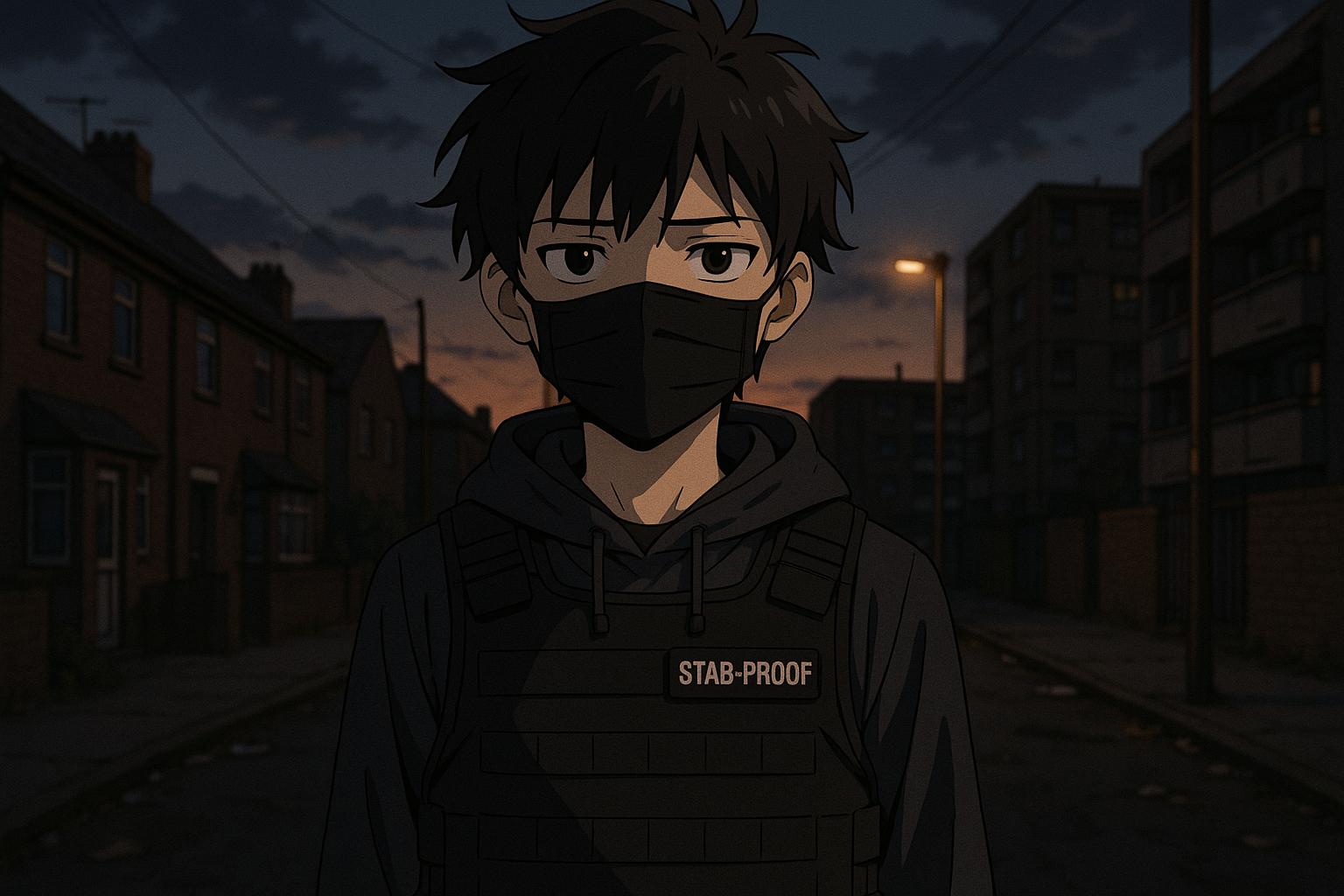Campaigners warn that the proliferation of stab-proof vest advertisements on platforms like TikTok is normalising violence among young people in the UK, reflecting escalating knife crime and prompting calls for stronger regulation and community support.
British children are increasingly encountering advertisements for stab-proof vests on social media platforms like TikTok and Snapchat, raising significant concerns among campaigners and community leaders. These videos, primarily targeted at young audiences, promote body armour priced at £50, tapping into fears surrounding knife crime in the UK. As knife-related violence continues to escalate, many teenagers report feeling unsafe at schools and in their communities.
Recent footage featured by MailOnline showcases youths in masks and balaclavas flaunting these vests, claiming they offer protection while engaging in everyday activities like fetching milk for their families or engaging in confrontations often romanticised in gang culture. One video provocatively advises, “If you’ve got to get milk for your mum from the ‘op block’, get a stab-proof vest.” The term “op” refers to an adversary, a commonplace in gang-related vernacular, further highlighting the troubling intersection of youth culture and violence.
Concerns voiced by anti-knife crime advocates are serious. Adam Brooks, whose father was murdered in a machete attack decades ago, warns that this trend may dangerously normalise violence among children. He argues that promoting such vests creates a false sense of security, enticing youths into believing they are invincible. “These vests won’t protect them from being stabbed in the face, neck or legs,” he noted, emphasizing that this trend could exacerbate rather than alleviate the ongoing crisis.
The UK currently lacks legal restrictions on the sale and ownership of stab protection products, making the proliferation of such advertisements particularly alarming. The group marketing these vests appears to operate out of Birmingham, reportedly offering delivery across the UK. This situation reflects a broader national concern, as knife crime has reached alarming levels. Statistics indicate there were 224 homicides involving a knife in a recent year, with over 60,000 knife-related offences recorded—a trend likely spurred by increasing gang violence and drug-related conflicts.
In a related examination of this epidemic, Idris Elba’s documentary, “Our Knife Crime Crisis,” echoes many of these themes, recounting the tragic loss of young lives to knife violence and the need for meaningful systemic change. The film notes significant shortcomings in societal responses to this issue, suggesting solutions like mentorship programmes and weapon-handover services to support at-risk youth.
Despite these calls for action, critics remain sceptical about governmental responses. Recent discussions have included proposals to introduce tougher sanctions against technology companies that fail to responsibly manage knife sales on their platforms. These initiatives, however, are still in nascent stages, suggesting that action often follows public outcry rather than proactive measures.
The phenomenon of children wearing stab-proof vests has been highlighted by numerous community leaders and campaigners. Wesley Cunliffe, a former drug dealer and now an anti-knife advocate, reported that many young people in places like Newport have started to wear these vests, stashing them in local areas as a misguided form of protection. This desire for safety frequently stems from real fears arising from well-publicised knife attacks and a growing culture of violence.
Research from the UK Parliament’s Youth Select Committee indicates that many youths carry knives primarily due to perceived threats, and social media’s role in glamorising violence is under scrutiny. The report advocates for a deeper public health approach to tackle the root causes of knife crime, exploring issues such as mental health and social isolation.
In the face of escalating violence, community figures across the country are increasingly vocal about the dangers of trivialising knife crime through advertisements for items like stab-proof vests. As Adam Brooks aptly summarised, “This could drag normal youths into gang violence or knife violence. This could escalate the problem.” With over 35,000 signatures collected for a petition calling for a parliamentary debate on knife crime, the need for a comprehensive response is becoming ever more urgent.
As Britain grapples with this growing crisis, it is clear that the impulse to shield oneself with protective gear reflects a deeper societal issue that requires not only immediate action but also long-term strategies to ensure the safety and wellbeing of the next generation.
Reference Map
Source: Noah Wire Services
- https://www.dailymail.co.uk/news/article-14706667/fury-children-stab-proof-vests-advert-social-media.html?ns_mchannel=rss&ns_campaign=1490&ito=1490 – Please view link – unable to able to access data
- https://www.ft.com/content/ca9d9525-9593-43e3-9c20-b69c83987d8d – Idris Elba’s BBC documentary, ‘Our Knife Crime Crisis,’ examines the escalating issue of youth knife violence in the UK. Highlighting the recent murder of 14-year-old Kelyan Bokassa, the film explores the rise in knife-related incidents over the past decade, with 225 stabbing homicides and 60,000 knife offences recorded in the year leading to June 2024. Elba, an actor and activist, guides the discussion, featuring testimonies from victims, offenders, and bereaved families. The documentary critiques the failures of social institutions and suggests practical solutions, such as weapon-handover services and mentorship programs for at-risk youth. Meetings with Prime Minister Keir Starmer and King Charles underscore the need for actionable change rather than empty promises, aiming to prompt both dialogue and tangible actions to combat knife crime in the UK.
- https://www.reuters.com/world/uk/uk-takes-aim-social-media-over-dangerous-knife-sales-2024-11-13/ – On November 13, 2024, the British government announced new proposals aimed at addressing the sale and promotion of illegal and dangerous knives on social media and online marketplaces. Interior minister Yvette Cooper emphasized that the nation is facing a significant knife crime epidemic causing severe harm to families and communities. The government committed to halving knife crime within the next decade. The proposals include tough sanctions for technology executives who do not adequately prevent illegal knife sales on their platforms and introduce a comprehensive ban on ninja swords.
- https://www.apnews.com/article/0a221cbd20d467cea952373bf13cab07 – Knives have become the weapon of choice for committing crimes in the UK, leading to increased public anxiety and a government crackdown. Despite strict gun control policies, knives are easily accessible and often end up in the hands of youths. Approximately 244 fatal stabbings occurred in England and Wales in the year leading up to March 2023. This violence has been highlighted by recent attacks, including the killing of a 14-year-old boy in London, which reminded Pooja Kanda of her own son’s fatal stabbing two years prior. Calls for stricter regulations have intensified, and new laws banning the sale of machetes and closing loopholes around zombie knife bans are set to take effect in September. However, experts and victims’ families remain skeptical of these measures’ effectiveness, emphasizing that deeper cultural issues must also be addressed.
- https://www.ft.com/content/6acf4dd3-d12d-440e-ae0f-a624da04beee – Richard Taylor, a campaigner against knife crime, has passed away at 75 due to prostate cancer. Originally from Lagos, Taylor became prominent following the tragic murder of his 10-year-old son, Damilola, in 2000. This deeply personal tragedy spurred Taylor, alongside his wife Gloria, to tirelessly seek justice and work to prevent knife crime. After Damilola’s death, the couple founded the Damilola Taylor Trust to support disadvantaged youth. Over the years, Taylor worked with other affected families, delivered impactful speeches, and influenced policymakers and public figures. He received an OBE in 2012 and continued his advocacy efforts until his retirement in 2020, though he remained involved in various initiatives. Despite enduring immense personal grief, Taylor maintained hope and encouraged young people to look toward a brighter future.
- https://www.apnews.com/article/e1448aedc89b16809f2d4a4e15075f93 – Actor Idris Elba has urged the British government to intensify measures against knife crime following recent teenage killings. Elba, joined by protesters from the ‘Don’t Stop Your Future’ campaign, called for a ban on machetes and serrated ‘zombie’ knives. London has seen a significant number of teenage deaths due to stabbings, with 21 teenagers killed in 2023, 18 by stabbing. Elba highlighted the impact of these crimes on young people’s lives and families and criticized tech companies for promoting knife imagery. Although the government announced a ban on threatening knives in August 2023, the legislation is yet to pass Parliament. Prime Minister Rishi Sunak’s spokesperson acknowledged the ongoing issue despite a decrease in knife crime and hospital admissions compared to pre-pandemic levels.
- https://publications.parliament.uk/pa/cm201919/youth-select-committee/full-report.html – The UK Parliament’s Youth Select Committee report, ‘Our Generation’s Epidemic: Knife Crime,’ examines the factors influencing young people’s involvement in knife crime. It highlights that many youths carry knives out of fear and a desire for self-protection, often due to perceived threats in their environment. The report discusses the role of social media and popular culture in normalizing and glamorizing knife carrying and violence. It also emphasizes the need for a public health approach to address the root causes of knife crime, including mental health issues, poverty, and social isolation. The committee recommends that the government commissions research to better understand the dangerous ways in which social media can be used to spread violence and increase fear among young people.
Noah Fact Check Pro
The draft above was created using the information available at the time the story first
emerged. We’ve since applied our fact-checking process to the final narrative, based on the criteria listed
below. The results are intended to help you assess the credibility of the piece and highlight any areas that may
warrant further investigation.
Freshness check
Score:
8
Notes:
The narrative highlights recent concerns and trends in the UK regarding knife crime and related advertisements on social media, which are contemporary issues.
Quotes check
Score:
9
Notes:
The quote from Adam Brooks emphasizes the potential for false security created by these ads. The lack of online references for the specific quote suggests it may be an original source.
Source reliability
Score:
6
Notes:
The narrative originates from the Daily Mail, which is known for its varied reporting quality and occasional bias. While the topic is serious, the source is not as reliable as major news outlets like the BBC or Reuters.
Plausability check
Score:
9
Notes:
The claims about knife crime and advertisements for stab-proof vests on social media are plausible given the context of rising knife violence in the UK and the impact of social media on youth culture.
Overall assessment
Verdict (FAIL, OPEN, PASS): OPEN
Confidence (LOW, MEDIUM, HIGH): MEDIUM
Summary:
The narrative covers a contemporary issue with plausible claims about knife crime and social media advertisements. However, the source reliability is moderate due to the Daily Mail’s mixed reporting quality, and the freshness is high due to the recent nature of the topic.













